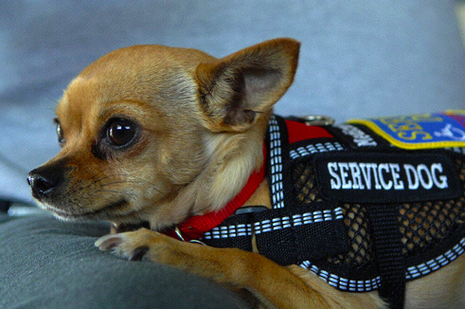Can Chihuahuas Be Service Dogs? Exploring Their Potential and Capabilities
Chihuahuas, known for their tiny size and big personalities, may not be the first breed that comes to mind when thinking about service dogs. However, these pint-sized pooches have surprising potential as assistance animals for people with various disabilities.
Understanding Service Dogs
Before diving into the specifics of Chihuahuas as service dogs, it is essential to understand what service dogs are and the tasks they perform. Service dogs are specially trained animals that assist individuals with disabilities in performing daily tasks and navigating their environment. These dogs are protected under the Americans with Disabilities Act (ADA) and are allowed to accompany their handlers in public places where pets are typically not permitted.
Chihuahuas as Service Dogs: Breaking Stereotypes
When most people think of service dogs, they envision large breeds like German Shepherds or Labrador Retrievers. However, smaller breeds like Chihuahuas can also excel in this role, particularly for certain types of assistance.
Advantages of Chihuahuas as Service Dogs
- Size: Their small stature makes them ideal for individuals living in apartments or those who have limited space.
- Portability: Chihuahuas are easy to transport, making them suitable for handlers who travel frequently.
- Longevity: With proper care, Chihuahuas can live up to 15-20 years, providing long-term assistance to their handlers.
- Intelligence: Despite their size, Chihuahuas are intelligent and can be trained to perform various tasks.
- Alertness: They are naturally vigilant, making them excellent for alerting their handlers to potential dangers or changes in their environment.
Types of Service Work Suitable for Chihuahuas

While Chihuahuas may not be suitable for all types of service work, they can excel in several areas:
1. Medical Alert Dogs
Chihuahuas can be trained to detect and alert their handlers to various medical conditions, including:
- Seizures
- Low blood sugar (for individuals with diabetes)
- Anxiety or panic attacks
Their keen sense of smell and attentiveness make them well-suited for these roles.
2. Hearing Dogs
For individuals with hearing impairments, Chihuahuas can be trained to alert their handlers to important sounds such as:
- Doorbells or knocking
- Smoke alarms
- Phone ringing
- Alarm clocks
Their small size allows them to easily nudge or paw at their handler to get their attention.
3. Psychiatric Service Dogs
Chihuahuas can provide emotional support and perform tasks for individuals with mental health conditions such as:
- PTSD
- Anxiety disorders
- Depression
They can be trained to provide comfort during anxiety attacks, remind handlers to take medication, or interrupt harmful behaviors.
Training Chihuahuas as Service Dogs
Training a Chihuahua to become a service dog requires dedication, patience, and consistency. Here is an overview of the training process:
- Basic Obedience: Start with fundamental commands like sit, stay, come, and heel.
- Socialization: Expose your Chihuahua to various environments, people, and other animals to ensure they remain calm in different situations.
- Task-Specific Training: Teach your Chihuahua the specific tasks they need to perform based on your disability.
- Public Access Training: Ensure your Chihuahua can behave appropriately in public settings.
- Certification: While not legally required, many organizations offer certification programs for service dogs.
Challenges and Considerations

While Chihuahuas can make excellent service dogs for certain tasks, there are some challenges to consider:
- Physical Limitations: Due to their small size, Chihuahuas may not be suitable for tasks that require strength or endurance.
- Temperament: Some Chihuahuas can be nervous or aggressive if not properly socialized, which is crucial for a service dog.
- Public Perception: People may not immediately recognize a Chihuahua as a service dog, potentially leading to challenges in public spaces.
- Weather Sensitivity: Chihuahuas are sensitive to cold weather and may require additional protection in harsh climates.
Success Stories: Chihuahuas in Action
Despite these challenges, many Chihuahuas have successfully served as assistance dogs. Here are a few inspiring examples:
- Lola: A Chihuahua trained to detect seizures for her owner with epilepsy.
- Tink: A hearing assistance dog who alerts her deaf owner to important sounds.
- Bentley: A psychiatric service dog who helps his owner manage anxiety and PTSD symptoms.
These stories demonstrate that with proper training and dedication, Chihuahuas can indeed become valuable service dogs.
Legal Considerations

It is important to note that under the ADA, service dogs of any breed or size are protected. This means that a properly trained Chihuahua service dog has the same rights as any other service animal.
|
Aspect |
Details |
|
ADA Protection |
Covered under the Americans with Disabilities Act |
|
Public Access |
Allowed in all public spaces where pets are typically prohibited |
|
Housing |
Protected under the Fair Housing Act |
|
Air Travel |
Allowed in airplane cabins free of charge |
FAQs
Q1: Can any Chihuahua become a service dog?
A: While any breed can potentially become a service dog, individual temperament and trainability are crucial factors. Not all Chihuahuas will be suitable for service work.
Q2: How long does it take to train a Chihuahua as a service dog?
A: Training typically takes 1-2 years, depending on the tasks the dog needs to learn and the individual dog's aptitude.
Q3: Are Chihuahua service dogs legally recognized?
A: Yes, under the ADA, service dogs of any breed or size are legally recognized and protected.
Q4: Can Chihuahuas be emotional support animals instead of service dogs?
A: Yes, Chihuahuas can make excellent emotional support animals, which have different rights and responsibilities compared to service dogs.
Q5: How much does it cost to train a Chihuahua as a service dog?
A: Costs can vary widely, from a few thousand dollars for owner-trained dogs to $25,000 or more for professionally trained service dogs.
Conclusion
While Chihuahuas may not be the conventional choice for service dogs, they have proven their capability in various assistance roles. Their intelligence, alertness, and portable size make them suitable for tasks such as medical alerting, hearing assistance, and psychiatric support.
However, it is crucial to consider the individual dog's temperament and the specific needs of the handler when deciding if a Chihuahua is the right choice for service work.
With proper training, socialization, and dedication, these tiny dogs can make a big impact on the lives of individuals with disabilities. As with any service animal, the key to success lies in the bond between the dog and their handler, as well as the quality of their training.
Whether you are considering a Chihuahua as a service dog or simply curious about their capabilities, it is clear that these small but mighty dogs have the potential to be excellent assistance animals for the right person and situation.
More Chihuahua Articles-







